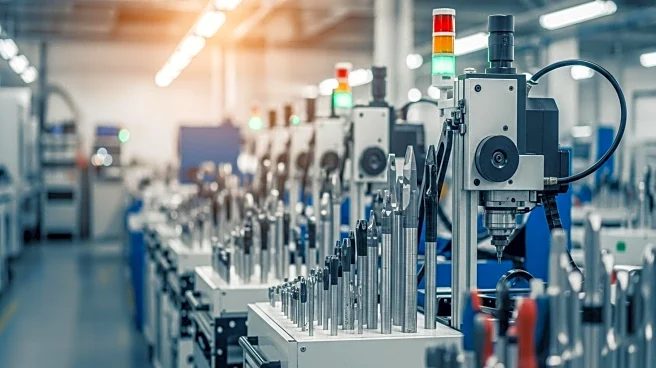What is the story about?
What's Happening?
The U.S. manufacturing industry is projected to face up to 3.8 million job openings over the next decade, according to research from The Manufacturing Institute and Deloitte. The sector has rebounded strongly from the global pandemic and is positioned for further growth, which will increase demand for skilled workers such as statisticians, data scientists, logisticians, engineers, and software developers. The report highlights that if workforce challenges are not addressed, more than 1.9 million of these roles could remain unfilled. Manufacturers are increasingly forming partnerships to strengthen recruitment and retention efforts, with many citing apprenticeships and flexible work arrangements as effective strategies.
Why It's Important?
The potential shortage of skilled workers in the manufacturing sector could significantly impact the U.S. economy. As manufacturing is a key driver of economic growth, the inability to fill these positions may slow down the sector's expansion and affect overall economic performance. Companies are facing challenges in attracting and retaining talent, which could lead to increased competition for skilled workers and potentially higher wages. Addressing this talent gap is crucial for maintaining the momentum of manufacturing growth and ensuring the sector can meet future demands.
What's Next?
The Manufacturing Institute is implementing initiatives to close the skills gap, including a high school internship toolkit and the FAME USA apprenticeship program. These efforts aim to create early-stage recruiting pipelines and train multi-skilled maintenance technicians. As the industry continues to grow, manufacturers will likely increase their focus on workforce development strategies to ensure they can meet the demand for skilled labor. The success of these initiatives will be critical in preventing a widening gap between demand and available skills.
Beyond the Headlines
The emphasis on digital skills and flexible work arrangements reflects broader trends in the labor market, where adaptability and technological proficiency are increasingly valued. This shift may lead to long-term changes in how manufacturing jobs are structured and perceived, potentially making the sector more attractive to younger generations seeking dynamic and tech-oriented careers.















